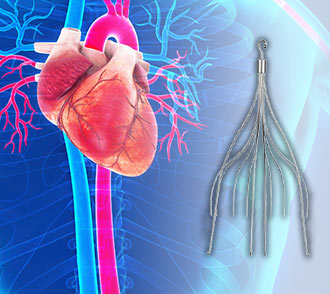
Trauma patients who got inferior vena cava (IVC) filters to prevent pulmonary embolism had no survival advantage, according to a recent study by the Boston University School of Medicine. According to an article in MedPageToday.com, among trauma patients who survived at least 24 hours after the time of injury, IVC filter use was not associated with a reduction in death rates, regardless of whether patients had deep vein thrombosis or pulmonary embolism at the time of the filter placement. If you believe you may have been injured because of an IVC filter, speak with an IVC filter lawyer immediately.
How Does an IVC Filter Device Work?
 Inferior vena cava filters or IVC filters are small, cage-like metal devices that are placed in the inferior vena cava, a large vein that delivers blood to the heart from the lower body. These medical devices are used to prevent pulmonary embolisms or blood clots that travel to the lungs and can be fatal. IVC filters help to break up clots that form in the legs. Retrievable IVC filters, or filters that can be removed once they have served their purpose, have been available for the last 10 years.
Inferior vena cava filters or IVC filters are small, cage-like metal devices that are placed in the inferior vena cava, a large vein that delivers blood to the heart from the lower body. These medical devices are used to prevent pulmonary embolisms or blood clots that travel to the lungs and can be fatal. IVC filters help to break up clots that form in the legs. Retrievable IVC filters, or filters that can be removed once they have served their purpose, have been available for the last 10 years.
Why Are IVC Filter Devices Dangerous?
There have been numerous reports of injuries caused by IVC filters because they can become detached from the IVC itself or because pieces of the device can break off. The device then circulates through the body and could potentially puncture major organs causing serious damage including internal bleeding.
 In 2010 alone, the U.S. Food and Drug Administration (FDA) warned that there had been nearly 1,000 reports of injuries related to the device due to migration or fracture of the device, embolization or perforation. Some of the injuries caused by IVC filters include organ perforation, severe pain, pulmonary embolism, internal bleeding and even death. Over the years, there have been several studies, which show that the dangers posed by IVC filters outweigh the benefits it provides.
In 2010 alone, the U.S. Food and Drug Administration (FDA) warned that there had been nearly 1,000 reports of injuries related to the device due to migration or fracture of the device, embolization or perforation. Some of the injuries caused by IVC filters include organ perforation, severe pain, pulmonary embolism, internal bleeding and even death. Over the years, there have been several studies, which show that the dangers posed by IVC filters outweigh the benefits it provides.
A 2015 study published in the journal “Annals of Surgery” determined that patients are no more likely to survive when they receive IVC filters, but are more than 80 percent more likely to develop deep vein thrombosis. Another study published in 2015 in the Journal of the American Medical Association found that the long-term risks of IVC filters.
Contact an IVC Filter Lawyer
 Our law firm is working with experienced IVC Filter lawyers, who are investigating these cases. If you have suffered a serious injury after being treated with one of these IVC Filters, you may be entitled to compensation for your medical bills, lost income and pain and suffering, among other losses. There is no fee unless you receive an award or settlement. Call our toll free number at 1-800-992-6878 or fill out a contact form online for a free (no obligation) case evaluation.
Our law firm is working with experienced IVC Filter lawyers, who are investigating these cases. If you have suffered a serious injury after being treated with one of these IVC Filters, you may be entitled to compensation for your medical bills, lost income and pain and suffering, among other losses. There is no fee unless you receive an award or settlement. Call our toll free number at 1-800-992-6878 or fill out a contact form online for a free (no obligation) case evaluation.
Source: http://www.medpagetoday.com/Cardiology/VenousThrombosis/60511?xid=nl_mpt_DHE_2016-09-29


